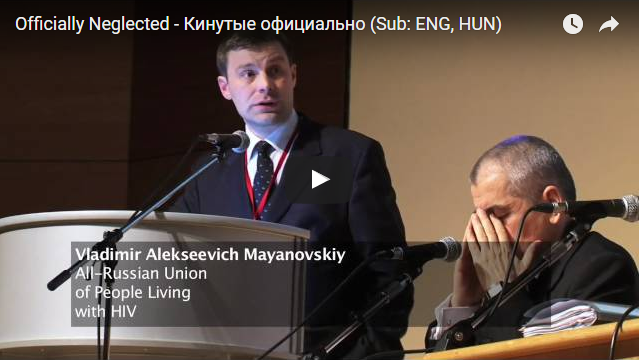Harm reduction in Russia is on the verge of collapse – watch our video made at the Moscow AIDS conference
HCLU is glad it could contribute to this decision with its own means and we thank for everybody for watching, sharing this video and signing the petition!
However, we would like to point out that the real “bad guy” in this story was not the Global Fund but the Russian government. We have to keep pressurize Russia to keep up to its promise made at the EECAAC in 2008 to support harm reduction programs and save its people from the threat of the HIV epidemic.
“The prevention of HIV is not a priority in the Russian Federation at the moment,” stated a speaker at the III. Eastern European and Central Asia Conference, held in Moscow, on October 28-30. These desperate words seem to be anachronistic at a huge AIDS conference with more than 2000 participants, co-organized by the Russian government – but unfortunately they are true. Last May at a similar conference the Minister of Health made a commitment and promised that his government will continue funding those HIV prevention programs that were set up by favour of the grants of the Global Fund to Fight AIDS, Tubercolosis and Malaria. In the previous years Global Fund helped to significantly scale up harm reduction programs targeting vulnerable populations, such as injecting drug users, sex workers and men who have sex with men. These programs are inevitable in the fight against the rapidly growing HIV epidemic, which is mainly driven by the sharing of injecting equipment among drug users and unprotected sex among MSM and sex workers. The number of people living with HIV/AIDS in Eastern Europe and Central Asia rose to 1.5 million (!) in 2007, almost 69 percent live in the Russian Federation. According to UN estimations, more than 60 percent of new transmission are due to the sharing of injecting equipment. According to international recommendations, harm reduction programs such as opiate substitution treatment and needle exchange programs are the most cost-effective tools to turn this trend back. Unfortunately substitution treatment with methadone is illegal in Russia (watch our previous movie on this issue), but needle exchange is tolerated. In other countries of Eastern Europe, such as Kyrgyzstan or Ukraine, substitution treatment is legal (watch our movie about harm reduction in Kyrgyzstan!)
The Global Fund spent hundreds of millions of dollars on setting up harm reduction programs in Eastern Europe in the past years, but recently it decided that Russia lost its eligibility for funds because it is not a “low income” country any more, but an “upper-middle” income country. The Global Fund’s position is understandable: it aims to support poor countries and requires rich countries to contribute to the fight against AIDS from their own national budget. In 2008 the Russian government seemed to acknowledge and accept its responsibility. However, this summer the Ministry of Health broke its promise. It anounced that the government will not support programs targeting vulnerable groups any more but it will rather launch a primary prevention campaign among the general population to promote “healthy lifestyles”. This declaration came as a shock for all NGOs and service providers working in the field, as well as for groups of people living with HIV. 22 needle exchange programs had to close their doors in Russia only in August, after their Global Fund grants run out.
The III. EECAAC in October seemed to be a window opportunity to pressurize the Russian government to keep to its promise. HCLU’s video advocacy team attended and filmed the conference. We tried to make government officials accountable, but with no success: the Minister of Health declined to address the delegates personally and nobody from the Russian government’s decision making bodies attended the conference. It seems they were aware of the fact that their position is untenable and decided to simply abstain from discussions. The only response from the government was a telegram from Prime Minister Mr. Putin welcoming the participants of the conference and making vague statements about the importance of care and support. The HIV/AIDS epidemic in Russia is officially neglected, and we cannot even estimate the catastrophic consequences of this irresponsible neglect. The only chance now is to ask the international community to intervene and do not let the Russian government let down its own people. The Global Fund Board of Directors will hold its meeting in November, so please sign on to this petition that urges them to save harm reduction programs from termination.
Please send your signature (name, organization, country) to the email address: saveglobus@gmail.com!
For more information please click here and download this file!
Posted by Peter Sarosi




